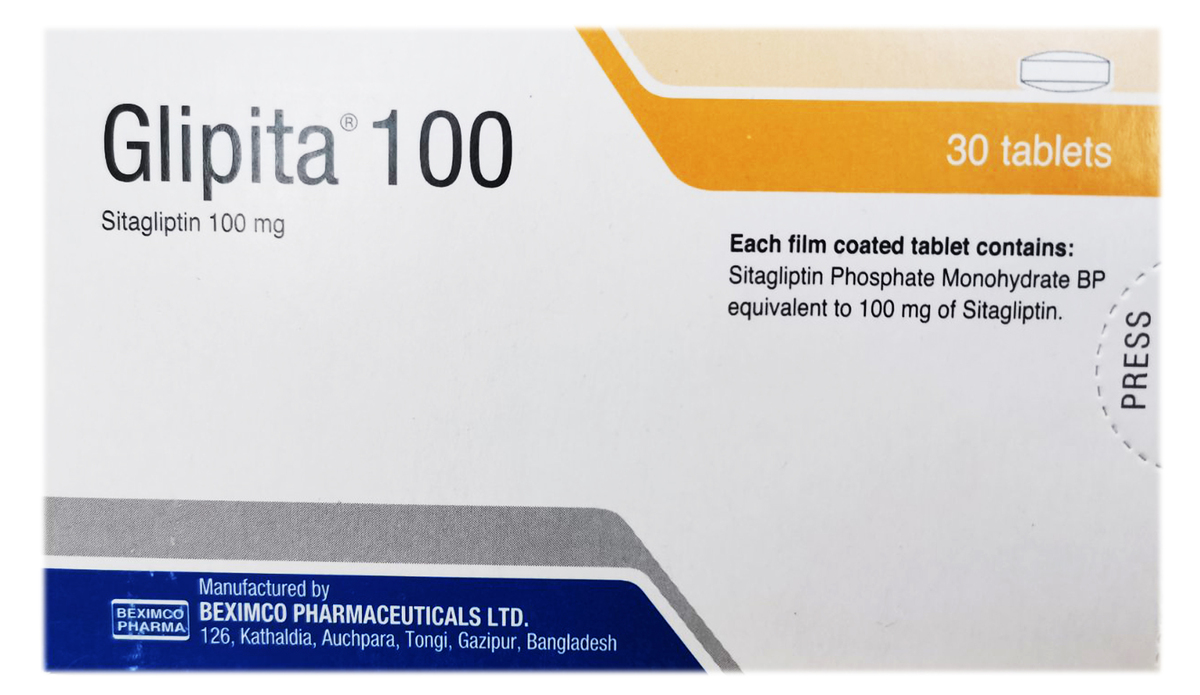Glipita® (Sitagliptin) 100mg Tablet ( 3*10 ) 30 tab

Generic
Sitagliptin
Indications
Sitagliptin is used alone or in combination with diet and exercise to enhance glycemic control in individuals with type 2 diabetes mellitus.
Important Use Restrictions: Sitagliptin should not be used in patients with type 1 diabetes or to treat diabetic ketoacidosis since it is ineffective in these circumstances. Sitagliptin has not been examined in people who have had pancreatitis in the past. It is uncertain if people with a history of pancreatitis are more likely to develop pancreatitis when using Sitagliptin.
Pharmacology
Sitagliptin is a DPP-4 inhibitor that is thought to work in type 2 diabetes patients by delaying the inactivation of incretin hormones. Sitagliptin increases the concentrations of active intact hormones, therefore enhancing and extending the activity of these hormones. The gut releases incretin hormones throughout the day, including glucagon-like peptide-1 (GLP-1) and glucose-dependent insulinotropic polypeptide (GIP), and levels rise in response to a meal. DPP-4, an enzyme, quickly deactivates these hormones. The incretins are part of an endogenous system that regulates glucose homeostasis physiologically. GLP-1 and GIP enhance insulin production and release from pancreatic beta cells when blood glucose levels are normal or high via intracellular signaling pathways including cyclic AMP. GLP-1 also reduces glucagon release from pancreatic alpha cells, which results in decreased hepatic glucose synthesis. Sitagliptin enhances insulin release and lowers glucagon levels in the circulation in a glucose-dependent manner by raising and prolonging active incretin levels. Sitagliptin has DPP-4 selectivity and does not affect DPP-8 or DPP-9 activity in vitro at concentrations comparable to therapeutic dosages.
Dosage & Administration
The recommended dose of sitagliptin is 50 mg twice a day and 100 mg once daily. Sitagliptin can be taken with or without food.
Interaction
Sitagliptin's Effects on Other Drugs: Sitagliptin had no effect on the pharmacokinetics of metformin, glyburide, simvastatin, rosiglitazone, warfarin, or oral contraceptives.
Sitagliptin raises the mean Digoxin concentration marginally. However, neither drug's dose must be adjusted.
Contraindications
A history of severe hypersensitivity to sitagliptin, such as anaphylaxis or angioedema.
Side Effects
Headache, upper respiratory tract infection, and nasopharyngitis are the most prevalent side effects. Hypoglycemia may develop in individuals receiving the combination of Sitagliptin, sulfonylurea, and insulin.
Pregnancy & Lactation
Category B Pregnancy. Rats and rabbits were used in the reproduction research. Because animal reproduction studies aren't usually predictive of human response, this medication should only be taken during pregnancy if absolutely necessary. Sitagliptin is released in nursing rats' milk at a milk-to-plasma ratio of 4:1. Sitagliptin is not known to be excreted in human milk. Because many medications are excreted in human milk, care should be used when administering sitagliptin to a breastfeeding woman.
Precautions & Warnings
If pancreatitis is suspected, sitagliptin should be stopped immediately and proper therapy should begin.
Dosage Adjustment is suggested in patients with moderate or severe renal insufficiency, as well as in patients with ESRD who require hemodialysis or peritoneal dialysis.
When used with medicines known to induce hypoglycemia, dose adjustments of sulfonylurea or insulin may be necessary to decrease the risk of hypoglycemia.
Hypersensitivity Responses: Serious hypersensitivity reactions have been reported in individuals treated with sitagliptin after the drug was approved for use. Anaphylaxis, angioedema, and exfoliative skin diseases such as Stevens-Johnson syndrome are examples of these responses. If a hypersensitive response is detected, cease sitagliptin, investigate other possible reasons of the incident, and begin alternate diabetes therapy.
Therapeutic Class
Inhibitor of Dipeptidyl Peptidase-4 (DPP-4)
Storage Conditions
Store below 25°C in a dry, light-free environment. Keep the medications in a secure location, out of reach of youngsters. Do not use after the expiry date. Only on the prescription of a qualified physician can it be dispensed.
